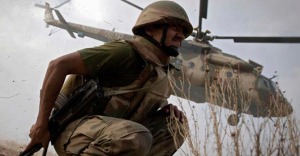
After the recent bloody terrorist attack in a Pakistani town of Peshawar, which took the lives of more than a hundred people, Pakistani security forces have sharply increased the number of special operations aimed at tracking down and arresting terrorists and those aiding them. The primary target of these operations are the members of Pakistani Taliban, which claimed responsibility for the attack in Peshawar. A special emphasis being place placed on military operations in North Waziristan and Khyber tribal areas which are better known as “agencies”. At the same time the “hunt” was launched in Balochistan and Southern Punjab provinces, and in the town of Karachi, the capital of province Sindh. Experts say that by January Pakistani officials managed to eliminate a total of 350 militants and arrested up to 500 suspects.
As of recently Islamabad has lifted a moratorium on the death penalty for those convicted on terrorism charges. Executions of those who was found guilty of carrying out terrorist activities began shortly afterwards. At the same time Pakistani authorities rejected calls from UN Secretary General and the EU to stop executions, stating that they don’t violate international law. In accordance with the “game plan” that had been brought forward by Pakistan’s PM Nawaz Sharif a total of 15 committees was created that were tasked with developing a set of measures to fight terrorism, including the establishment of special military tribunals that would investigate all the cases related to terrorist activities.
Additionally, the Ministry of Internal Affairs is working to expand the list of banned extremist organizations (as of today a total of 63 groups is officially banned in Pakistan) to include some 23 more organizations, including those “rebranded” that had already been on the the “black list”. It’s expected that the Islamic State will be officially declared illegal in Pakistan, since it has began infiltrate county’s borders.
There’s credible evidence that some groups of Pakistani Taliban are preparing to launch new attacks in the most vulnerable parts of the country, including the capital and other major cities. In this regard the security forces have been carrying out revisions of the places that are poorly protected against terrorist attacks, including malls, schools, universities, hospitals, etc. To minimize the infiltration threat additional armed units have been dispatched to patrol the Pakistan-Afghan border.
In early January both the Senate and the National Assembly of the Parliament of Pakistan have passed the 21st Amendment to the Constitution, which created the legal basis for the establishment of military tribunals empowered with the authority to try terrorism cases. It is explained by the fact that all legal acts that concern human rights and freedoms doesn’t cover the military-related activities. At the same time changes have been made to the local law on the army which was passed back in 1952, as of now military courts in Pakistan can carry out investigations against terrorists and their supporters, including members of extremist organizations, which, under the guise of the fight for religion are attempting to undermine the Pakistani state, by engaging in kidnapping, terrorist financing, manufacture of explosives, and violation of the rights of religious minorities. The above listed acts are adopted for two years because of the threats to the integrity and security of Pakistan posed by religious extremist groups.
All the political parties have supported legal initiatives almost unanimously except for the two remaining pro-Islamist parties, due to the strong pressure from the military officers of the country. Unfortunately, despite the fact that the explosion in Peshawar has covered the gap between many political forces in Pakistan, there are those not ready to approve the legalization of special military tribunals, since they had previously been used for achieving different goal, namely to eliminate undesirable politicians. But all these doubts are being neglected by the military officials, they appeal to the urgency of the measures that are to be taken to fight terrorism effectively. It is clear that Islamabad is now more preoccupied with ensuring the security of the state, rather than with the
indulgence towards extremism.
Those measure seems to be pretty timely, should one concern the fact that the Islamic State has been strengthening its presence on the Pakistani-Afghan border. Moreover, the IS has recently announced the chief of Khorasan (a historic name given to Afghanistan, Pakistan and India). It happened during a ceremony that was witnessed by over a hundred fighters from the Pakistani and Afghan Taliban. Now Hfiz Saeed Khan Orakzai is the leader of this region according to the Islamic State, he’s one of the six warlords that have pledged their loyalty to the IS in October 2014. The “ceremony” and the consequent beheading of Pakistani soldiers was carefully filmed and then uploaded on the Internet.
Thus, ISIL is now slowly displaces the Taliban structures that had previously dominated the Afghan border with Pakistan. In addition, the IS emissaries started appearing in Balochistan, where they’ve managed to reach an agreement of cooperation with the radical Sunni groups Lashkar-e-Jhangvi and Jundallah. Most experts believe that this is just the first steps of the IS operations in Pakistan.
So it won’t be an exaggeration to say the Pakistani military have all the right reasons for the adoption of tough security measures. And they do adopt them instead of rallying marches that are only good for boosting ratings of some European politicians that have clearly lost the trust of their people.
Viktor Titov, Ph.D, is a political commentator on the Middle East, exclusively for the online journal “New Eastern Outlook”.
